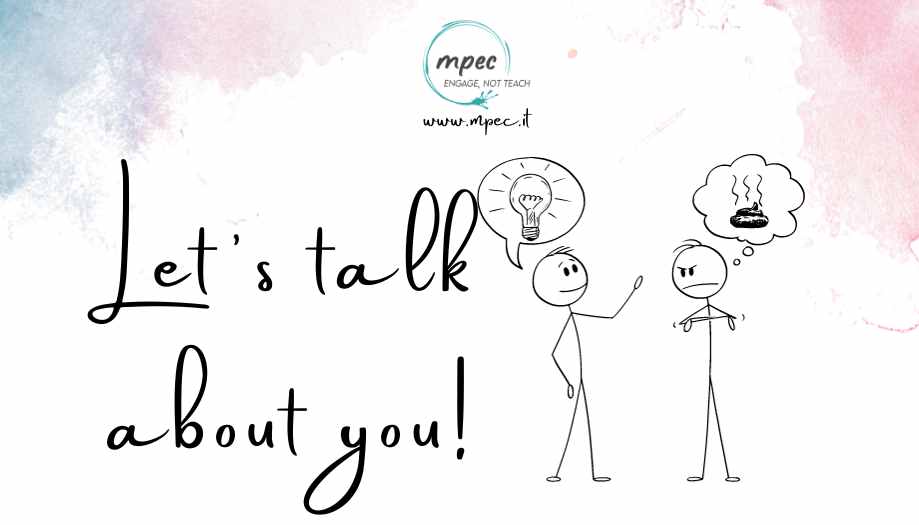Benvenuti alla nostra sessione del Business Communication Club su “Parliamo di Te! Domande Personali Che È Ok Fare in Inglese.” Navigare il mondo delle domande personali in una nuova lingua può essere complicato, specialmente in un contesto professionale o sociale dove le norme culturali possono differire. Oggi esploreremo domande personali appropriate che favoriscono le connessioni senza oltrepassare i limiti. Discuteremo la sottile linea tra essere amichevoli e rispettosi, e impareremo come impegnarsi in conversazioni personali ma adeguate in inglese. Questa sessione ti aiuterà a diventare più a tuo agio nell’iniziare e rispondere a domande personali in vari contesti.
Non sai da dove iniziare?
Not sure where to start?
6 Idioms we use in English to talk frankly about personal things
- Open book 📖
- Meaning: Someone who is an open book is easy to understand or know about because they express their feelings openly.
- Example: “I’m an open book when it comes to my hobbies; I love sharing about my weekend hikes.”
- Wear your heart on your sleeve 💖
- Meaning: To openly and freely express your emotions.
- Example: “She wears her heart on her sleeve, so it’s easy to tell how she feels about the new project.”
- Heart-to-heart 💑
- Meaning: A sincere, serious, or personal conversation.
- Example: “We had a heart-to-heart about our goals for the year; it was very insightful.”
- Spill the beans 🌱
- Meaning: To give away a secret or to tell something confidential.
- Example: “Okay, I’ll spill the beans. I’m planning to start my own business next year.”
- Let one’s hair down 🥳
- Meaning: To relax and enjoy oneself because you are in a comfortable environment.
- Example: “At our team outings, it’s nice to let your hair down and talk about things other than work.”
- Speak one’s mind 🗣️
- Meaning: To say what you really think.
- Example: “I always appreciate it when colleagues speak their minds during meetings.”
Set 1: Getting to Know Colleagues
- “What are some safe personal questions you can ask a new colleague to get to know them better?”
- “How do you usually break the ice with someone you meet in a professional setting?”
Key Grammar/Vocabulary Expressions:
- General interests (e.g., “What do you like to do in your free time?”)
- Professional background (e.g., “How did you get into this field?”)
- Light personal details (e.g., “Do you enjoy any particular sports or hobbies?”)
- Cultural interests (e.g., “What kind of music or movies do you like?”)


Set 2: Social Conversations in English
- “What questions are considered polite and friendly in social settings when speaking in English?”
- “Can you share examples of personal but respectful questions you’ve used in social conversations?”
Key Grammar/Vocabulary Expressions:
- Hometown and travel (e.g., “Where are you originally from?”, “Have you traveled to any interesting places?”)
- Food and cuisine (e.g., “Do you have a favorite cuisine or dish?”)
- Leisure activities (e.g., “What do you enjoy doing on weekends?”)
- Books and movies (e.g., “Have you read any good books or seen any good movies recently?”)
Set 3: Cultural Sensitivity and Boundaries
- “How do you gauge which personal questions are appropriate based on cultural backgrounds?”
- “What topics are generally off-limits or sensitive when making conversation in English?”
Key Grammar/Vocabulary Expressions:
- Cultural awareness (e.g., “Being aware of cultural sensitivities is important when…”)
- Respecting boundaries (e.g., “I always try to respect personal boundaries by…”)
- Inclusive language (e.g., “Using inclusive language helps to…”)
- Non-intrusive questions (e.g., “I stick to non-intrusive questions like…”)

Remember – there is always more! Here is your Follow Up Video:
#PersonalQuestions #EnglishConversations #GettingToKnowYou #SocialEnglish #FriendlyQuestions #CulturalSensitivity #EnglishDialogue #ProfessionalEtiquette #ConversationalEnglish #OpenCommunication #RespectfulDialogue #PersonalBoundaries #EnglishSocialSkills #HeartToHeartEnglish #CulturalAwareness #PersonalTopicsInEnglish #BuildingRapport #EnglishInteractions #EffectiveCommunication #InclusiveLanguage
#ESLConversations #LearnEnglish #ESLSocialSkills #EnglishLanguageLearning #ESLEtiquette #SpeakingEnglish #EnglishPractice #ESLCulturalSensitivity #EnglishForBeginners #EnglishVocabulary #PracticalEnglish #EnglishIdioms #LanguageBarriers #EnglishFluency #EverydayEnglish #EnglishForAdults #LanguageLearning #EnglishSpeaking #ESLDialogue #EnglishCommunicationSkills







